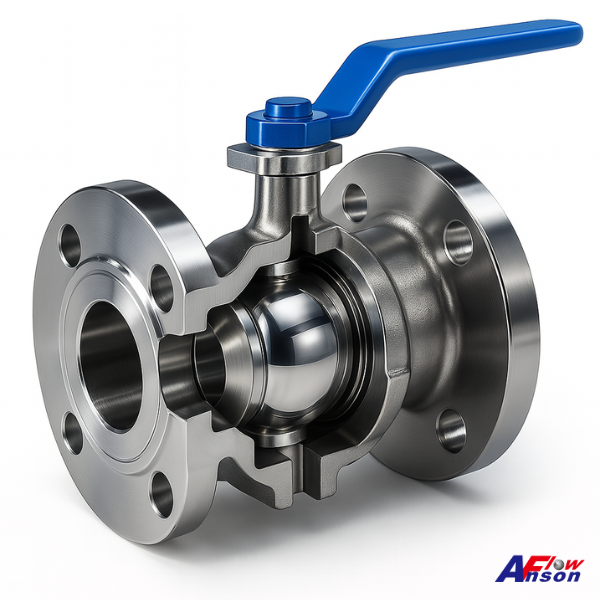What is a Metal Seated Ball Valve? Applications, Benefits, and Selection Guide

In demanding industrial applications where high temperatures, abrasive media, or extreme pressures are involved, metal seated ball valves are the go-to solution. Unlike soft-seated valves, which use PTFE or other polymer-based seals, metal seated valves use precision-engineered metal-to-metal contact to ensure tight shutoff under harsh conditions.
🔧 What is a Metal Seated Ball Valve?
A metal seated ball valve uses a ball and seats made from hardened metal materials, such as stainless steel, Stellite, Tungsten Carbide, or Chromium Carbide coatings. The ball rotates within the valve body to control flow, just like standard ball valves, but the metal contact surfaces can withstand far more severe conditions.
✅ When to Use Metal Seated Ball Valves
Metal seated ball valves are typically chosen for:
- 🌡️ High-temperature environments (up to 540°C or more)
- 🧪 Abrasive or slurry applications
- 🔥 Fire-safe systems
- ⚙️ Steam, hydrocarbons, refinery, or power generation pipelines
- 🧼 Applications requiring frequent cycle life with minimal maintenance
⚖️ Metal Seated vs. Soft Seated Ball Valves
Understanding the difference between metal seated and soft seated ball valves is critical when selecting the right valve for your application.
|
Feature |
Soft Seated Ball Valve |
Metal Seated Ball Valve |
|
Sealing Material |
PTFE, TFM, PEEK, Delrin (Acetal) |
Hardened Metal (e.g. Stellite, Tungsten Carbide) |
|
Temperature Range |
PTFE: ~140°C; PEEK: ~260°C; Delrin: ~80°C |
Up to 500°C (or higher with special alloys) |
|
Media Suitability |
Clean, non-abrasive fluids and gases |
Abrasive, corrosive, or high-solid media |
|
Seal Tightness |
None Visible Leakage |
Class IV–V |
|
Wear Resistance |
Good with PEEK/Delrin; lower with PTFE |
Excellent (ideal for erosion and slurry) |
📝 Summary:
- Soft seated valves (PTFE, PEEK, Delrin) are great for clean media, moderate temperature, and tight shutoff needs.
- Metal seated valves are ideal for high-temperature, high-abrasion, and high-cycle environments where durability is critical.
💡 Key Benefits of Metal Seated Ball Valves
|
Feature |
Benefit |
|
🔥 High Temperature Resistance |
Suitable for steam, thermal oil, and combustion systems |
|
🛠️ Durable Against Abrasives |
Handles sand, catalyst particles, slurries, etc. |
|
🔄 Extended Cycle Life |
Ideal for high-frequency on/off operations |
|
🔒 Reliable Shutoff |
Metal-to-metal contact maintains seal even under pressure and thermal cycling |
|
🔧 Repairable/Serviceable Design |
Many metal seated valves allow for lapping or replacement of internal components |
📏 How to Select the Right Metal Seated Ball Valve
When selecting a valve, consider:
- Temperature & Pressure Ratings
- Media Composition (e.g., solids, corrosives)
- Actuation Type – Manual, Pneumatic, or Electric
- Valve Size & Connection Type – Flanged, Threaded, or Welded
- Industry Standards – API 6D, ANSI, ISO, Fire-safe certifications
🏭 Industries That Rely on Metal Seated Valves
- Petrochemical plants
- Power generation
- Pulp and paper industry
- Mining & mineral processing
- Steel and metallurgy
- Oil & Gas
🚀 Why Choose Anson Flow Metal Seated Ball Valves?
At Anson Flow, we provide OEM and standard series metal seated ball valves tailored to demanding applications. We offer:
- Precision-machined hard-coated balls and seats
- Fire-safe, anti-static, ISO pad-ready
- Private-label options
- Specialty materials available on request: alloy steel, Hastelloy®, Duplex and Super Duplex stainless, nickel alloys, Inconel®, and titanium。
- Actuated sets with pneumatic or electric control
👉 Need a sample or quote? Contact us to discuss your application.
📞 Let’s Talk
Whether you’re sourcing for a refinery, power plant, or abrasive slurry system, metal seated ball valves offer the durability and reliability your project demands.
📧 Email us at: sales@ansonflow.com
🌐 Visit: https://www.ansonflow.com/
